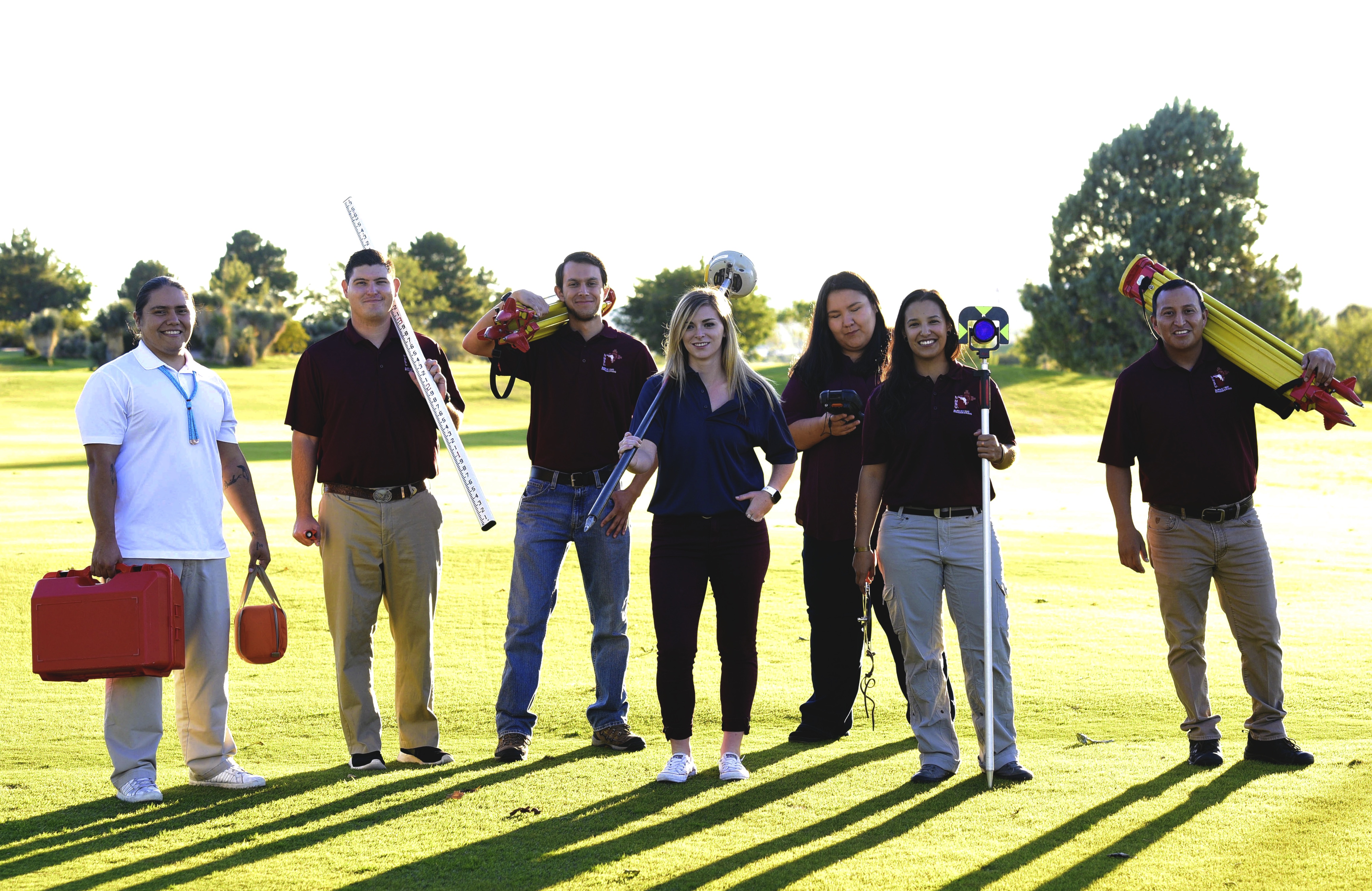
The National Council of Examiners for Engineering and Surveying awarded its 2022 Surveying Education Grand Prize to the New Mexico State University Geomatics/Surveying Engineering program. The $25,000 grand prize is the second received by NMSU, the first awarded in 2019. The NMSU program received a $10,000 prize in 2017 and a $15,000 prize in 2020 from the organization.
The NCEES Surveying Education Award recognizes surveying/geomatics programs that have a broad and robust curriculum and best reflect NCEES’ mission to advance licensure for surveyors in order to safeguard the health, safety and welfare of the public. The award is intended to modernize the geomatics curriculum, encourage programs to engage their students with other professionals, introduce them to both historical and new technology and promote licensure.
Over the past several years, the NMSU College of Engineering has made significant changes to the program to keep pace with changing technology in the profession to include an emphasis on geomatics and make the program more accessible to students. The program was redesigned with substantial direction and support from industry, state and national professional societies to meet current and future industry demands.
The geomatics/surveying program collected more than $500,000 from private donors, the New Mexico Board of Licensure for Professional Engineers and including the NCEES awards, to upgrade classrooms, update the curriculum, support students, purchase new advanced technologies such as satellites, drones and high-resolution scanners.
“Geomatics and surveying are very related. But geomatics is more encompassing than surveying. Surveying is determining the precise location of objects on, above and underneath the Earth’s surface. In the past, this was done with equipment such as chains and transits. However, with the growing use of modern technologies geomatics became more prominent. Geomatics is an applied science and technical field that relies on modern technologies. Geomatics now not only includes the measurement of locations but also the analysis and management of spatial data relating to the Earth,” said Professor Ahmed Elaksher, Geomatics coordinator.
With the advancement of new technologies, employers are increasingly seeking graduates with a four-year bachelor’s degree in surveying or geomatics: NMSU has the only four-year degree program in geomatics/surveying engineering in New Mexico. A bachelor’s degree is required for registration as a professional land surveyor in the state of New Mexico, as well as for work in the geospatial industry for private surveying, construction and engineering firms, state and national highway departments, land commissions and agencies.
“Graduates need to not only be trained on using modern technologies but also equipped with the knowledge and understanding necessary to effectively collect, analyze and interpret geospatial data. This is unachievable without a four-year degree,” Elaksher said.
Additionally, many states are requiring a degree from an ABET-accredited program for licensure. NMSU’s program in geomatics received accreditation in 2021 by the Applied and Natural Science Accreditation Commission of ABET, the global accreditor of college and university programs in applied and natural science, computing, engineering and engineering technology.
ABET accreditation assures that programs meet standards to produce graduates ready to enter critical technical fields that are leading the way in innovation and emerging technologies, and anticipating the welfare and safety needs of the public.
“Recently, there has been a rapid growth of jobs created yearly in this field and there exists a great need for qualified graduates equipped with the knowledge and skills to utilize geospatial technologies in many mapping activities.”
To meet those needs, NMSU has made the program more accessible to students. A room is equipped with technology for teaching geomatics classes online. The flexible program enables students to attend two years at a community college and two years at NMSU either face-to-face or online to complete the degree. Articulation agreements between NMSU and other two-year institutions have been made to facilitate this process.
Courses cover a wide range of classic and contemporary topics in surveying and geomatics. Topics include Public Land Survey System, Legal Principles and Boundary Law, Spatial Data Adjustment, Ethics and Professionalism in Surveying and Mapping, GNSS positioning, Precise Aerial Mapping, Construction Surveying, and Emerging Techniques in Geospatial Technologies.
Students learn new technologies such as drones, laser scanning, satellite positioning and automated machine control. Students are also required to take a practicum course under the supervision of a professional land surveyor.
“The course gives students the opportunity to gain academic credit through participation in a real-world assignment. These courses equip students with the knowledge and skills they need to be of high quality, academically competent and fully capable of becoming distinguished in their profession,” Elaksher said.
Geomatics is very important in today’s life. Surveyors provide reliable data for most Geographic Information Systems that are employed in urban planning, disaster management and natural resource conservation. Geomatics is essential in creating digital twins that enable architects and engineers design new facilities. Accurate mobile mapping deliverables are vital for smart cities and autonomous driving systems.
“This is a field that is in high demand. With more surveyors retiring nationwide and the rapid advances in this field, the demand for well-educated and skilled surveyors is booming,” said College of Engineering Dean Lakshmi N. Reddi. “Our geomatics graduates have 100% employment and earn very competitive salaries.”
